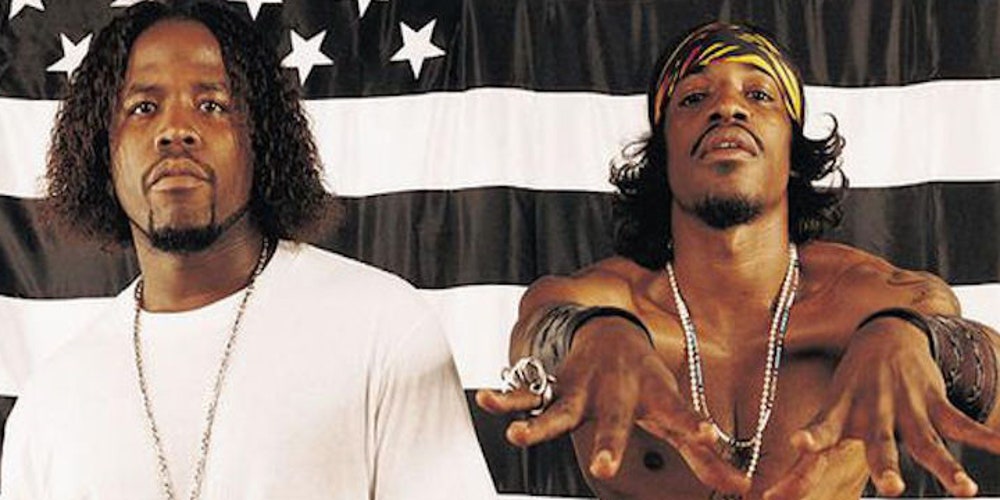Speaking to Spin Magazine in 2001 for a state-of-the-art interview two rappers from Atlanta explained the current state of the hip-hop scene. “They’re real comfortable out there right now. Nobody’s hungry anymore,” said one. Followed by the other frontman stating: “Man, as far as hip-hop… I used to be a real big fan, but not anymore, really. It’s not that it’s not good. It’s just not inspiring”.
Three albums deep into their career Andre 3000 and Big Boi, the composite members of duo OutKast, were getting bored with the music being released at the time. Something had to change.
OutKast’s previous albums, ‘Southernplayalisticadillacmuzik’ (1994), ‘ATLiens’ (1996) and ‘Aquemini’ (1998), all redefined the meaning of hip-hop and put the Atlanta duo on the map. A mix of fans were drawn to them through their range samples, heavy beats, southern patois and storytelling ability. With each record being so uniquely refined in OutKast were pushed to the forefront of the scene. The duo were now household names who had proved themselves and everyone else of what they were capable of. Their next record didn’t have to keep breaking barriers, but it did, and it cemented their status as the biggest duo in hip-hop and beyond.
‘Stankonia’ was released on Halloween in 2000, 20 years ago today. The album shows OutKast at their most extreme; the duo had reached the mainstream by this point, but they went against the idea of making another album to fit the mould. Their hunger to keep stretching the sounds of hip-hop hadn’t succumbed.
– – –
– – –
The album was named after the recording studio that the duo bought in 1998. ‘Stankonia’ was a word that Andre created himself, and he explained that ‘Stankonia’ “is this place I imagined where you can open yourself up and be free to express anything”.
The album cover shows Andre standing shirtless facing forward, arms stretched outward and chin held high, along with Big Boi rocking a baggy t-shirt and big necklace. Both are placed in front of a huge drooped black and white American flag. The image is simple yet iconic, but gives little away as to how colourful the 24 track album really is.
The leading single ‘B.O.B’ exemplifies the album; it never sits still, unapologetically getting in your face with constant surprises. Bombs Over Baghdad remains calm for a maximum of five seconds, before a countdown from Andre 3000 sets off the fireworks. Both loud and lively, the song makes commentary of life in the ghetto, whilst referring to political turmoil in Iraq at around the same time. The duo’s influence on the 90s rave culture can be heard through drum n bass beats. The track is constantly switching, adding other layers.
– – –
– – –
With most OutKast songs, it’s easy to tell who has had the most influence creating the track. Big Boi firmly stands at the front for ‘We Luv Deez Hoez’. The sarcastic pimping song is both catchy and straight up gangster. Whilst ‘Stankonia (Stanklove)’ is all Andre 3000, he sings the hook, stretches his voice during the verses. The song is all harmony, with no rapping, providing more of an insight into what you would hear more of on their following album ‘Speakerboxx / The Love Below’.
The duo were now grown ups, and the subsequent problems they faced are referenced on the album. Standout track ‘Ms. Jackson’ is a prime example of this. Both radio friendly and catchy, the track pushed them into stardom, winning a Grammy and being the first of three songs to reach No.1 on the Billboard charts. If you hadn’t heard of OutKast before, you certainly would’ve by now.
Influenced by Andre and his relationship with Erykah Badu, ‘Ms. Jackson’ is the story of ruined relationships, and promises that weren’t kept. A storm is centred as the central theme through the music video and track, a metaphor for ‘stormy’ relationships, as Andre states: “Hope that we feel this, feel this way forever/You can plan a pretty picnic, but you can’t predict the weather, Ms. Jackson”.
– – –
– – –
‘Stankonia’ is a journey through sounds of funk and hip-hop, ‘So Fresh, So Clean’ is a straight up anthem, both catchy in the hook and beat. Then, there’s the turbulent ‘Toilet Tisha’, a vivid story from the hood of a 14-year old girl struggling with the idea of having a baby. ‘Spaghetti-Junction’ shows the duo’s chemistry at its fullest. Each raps a verse before coming together on the last back-to-back, with their flows blending into each other. The opener ‘Gasoline Dreams’ has guitar strings that hit you like a truck and ‘Gangster Sh*t’ is an aggressive head bopper. In-between songs, skits lead onto tracks or are used for comedic effect in heavy Atlantian slang.
Like Big Boi said in an interview when it came to making ‘Stankonia’: “All the doors were blown off, there were no boundaries”. In hindsight, that’s when some of the best music is made. But more importantly, it opens the doors for other artists to enter. The Young Thugs and Migos of the scene wouldn’t be around if OutKast didn’t lay down the foundations and if albums like ‘Stankonia’ weren’t made. The group was always in the neverland, not belonging anywhere, setting the example that it’s okay to be different, as those who do shine better than the rest.
When Big Boi and Dre said they were bored with the state of hip-hop, they managed to bring back a spark from the scene that had been missing. ‘Stankonia’ was fun, something that gangster hip-hop wasn’t. It appealed to a wider audience and broadened the scope of music altogether.
– – –
– – –
‘Stankonia’ has been re-issued for its 20th anniversary.
Words: Joe Hale

